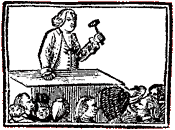The Case of Edward Jackson v. Josiah Cotton
 In September 1752, the Rev. Edward Jackson filed suit against his cross-Woburn rival, the Rev. Josiah Cotton, for calling him “a vile, wicked man, a fornicator, and unfit to be a minister.” And all because Cotton’s brother Roland had said he’d seen evidence that Jackson had fathered a child by his housekeeper, Kezia Hincher.
In September 1752, the Rev. Edward Jackson filed suit against his cross-Woburn rival, the Rev. Josiah Cotton, for calling him “a vile, wicked man, a fornicator, and unfit to be a minister.” And all because Cotton’s brother Roland had said he’d seen evidence that Jackson had fathered a child by his housekeeper, Kezia Hincher.
For his attorney, Jackson hired Edmund Trowbridge (1709-1793), a scholarly lawyer from Cambridge. (Both men had grown up in Newton.) At some point midwife Hannah Poole and her husband gave him a written statement that, contrary to report, they had never heard Hincher identify Jackson as the child’s father.
Josiah Cotton hired Benjamin Kent (1708-1788) of Charlestown to defend him. According to Woburn historian Samuel Sewall, Cotton
rested his defense, not upon any direct answer to what had been alleged against him in Mr. Jackson’s Declaration, but upon the denial of some promise that Mr. Jackson had averred that he (Mr. Cotton) had made himI suspect Cotton argued that he’d never promised Jackson a public apology like that already delivered by his brother Roland, which should have been enough to restore Jackson’s reputation.
At the Court of Common Pleas, Jackson won a judgment of £1,000, plus court costs of £1.16s.6d. That was a huge sum by any measure. The magistrates might have meant to pressure Cotton into a public apology before things went any further.
Instead, Josiah Cotton appealed to the Superior Court. The ministers had another chance to settle, but let the case go to a jury. And then Jackson lost almost everything he had won.
In January 1753, the jurors decided that Jackson should not receive any damages and owed Cotton legal costs, implying that his libel suit was baseless and that he was indeed the father of Hincher’s child, then about one year old.
Perhaps the Cottons had mounted a firmer defense at this level, gathering evidence that they hadn’t had before. In the next century Sewall would hear this story from a man named Bartholomew Richardson:
Two of them [enemies of Jackson] in particular, according to a tradition derived from a source of high respectability, encouraged Mrs. Henshaw to go before a magistrate, and swear to the truth of the report which she had put in circulation [about Jackson fathering her child]; and that when she had taken an oath to this effect, they were seen by a friend of Mr. Jackson who was looking on, to put money into her lap.However the Superior Court verdict came about, Jackson’s reputation was now even lower than before. Reportedly, an official council of ministers gathered to deliberate on his standing.
TOMORROW: But Jackson hadn’t given up.

1 comment:
Well now, who am I to quibble with
Bartholomew Richardson's "tradition derived from a source of high respectability"? Who would dare even attempt to controvert such a noble and well spoken assertion!
Post a Comment